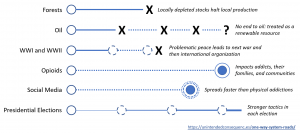Now that the US presidential election is over (well, probably) we’ve seen calls for unity (at least from Biden’s side). But what is unity? What do you need in order to have it? And if we don’t have it now, why not?
This story of unintended consequences starts with business models that benefit from division. Always look for incentives in designed systems and in systems that emerge.
Old News, New News
News of all types – real, fake, stressed, ignored, and biased – was a big part of the last four years. Let’s look at the general change in the media industry from pre-Internet days to today.
If we don’t have unity today, but maybe did in the past, is some of that due to changing news industry business models?

